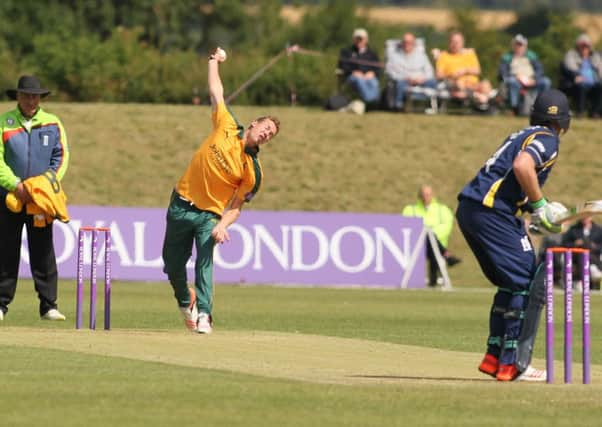OPINION: Safety must be top priority for England's sportsmen and women


Think of football in this country, with all its riches courtesy of Sky TV. Tennis and golf can also make their top players millionaires, while across the Atlantic in the USA American football, basketball and baseball can all help the best players land the jackpot.
Despite all the lucrative money on offer, however, surely one thing is supreme — and that is the participants’ safety as they go about what is, at the end of the day, their job?
Advertisement
Hide AdAdvertisement
Hide AdMany years ago the vulnerability of sportsmen and women on their particular field of play was highlighted when one of the world’s best female tennis players, Monica Seles, was the victim of a random stabbing attack.
Seles, who was raised in the former Yugoslavia and won eight Grand Slam singles titles before she was 20, was the world number one as she vied with another tennis legend, Steffi Graf, for top spot.
But in 1993 that rivalry almost cost Seles, the youngest French Open champion when she was 16, her life.
During a break in play at a match in Germany, Seles was attacked by a man in the crowd, who stabbed her as she sat on the chairs awaiting the restart of the match.
Advertisement
Hide AdAdvertisement
Hide AdFortunately for Seles, the knife just missed severing her spinal cord, but she suffered serious physical injuries — and arguably the mental scars never went away.
Seles, stabbed in the back, returned to top-flight action two years later and did win a fourth Australian Open, but she was understandably unable to regain her number one-winning form consistently.
She said the attack was never far from her mind — and when a fan charged at arguably the sport’s best player of modern times, Roger Federer, seven years ago while he was on court, it brought back memories of the 1993 attack.
Football in this country has also had its problems in recent years with the odd fan racing on to the pitch, usually to confront goalkeepers who must feel the most vulnerable.
Advertisement
Hide AdAdvertisement
Hide AdFor example, three years ago a Swindon Town supporter was arrested after he raced on to the pitch and allegedly punched Leyton Orient keeper Jamie Jones.
It was the third such incident in a year on football pitches in England.
All of those cases highlight the threat most sportsmen and women face everytime they step on to the field of play — and that is why it is understandable to read of the discussions surrounding England cricketers and their forthcoming tour of Bangladesh.
Last year Australia opted not to go to Bangladesh because of fears for players’ safety.
Advertisement
Hide AdAdvertisement
Hide AdRecently 20 people were killed in an attack by five gunmen who were clearly targeting Westerners — an attack for which ISIS later claimed responsibility.
The ECB have said they are confident that security arrangements in place mean it is safe for the players to travel.
But England managing director Andrew Strauss has said no player would be forced to go on the tour if they had concerns about personal safety.
It is not the first time our Test stars have faced such difficult decisions because of terror concerns regarding overseas tours.
Advertisement
Hide AdAdvertisement
Hide AdIn 2001, the tour of India was shrouded in doubt after the 9/11 attacks on the US.
Fast bowler Andrew Caddick pulled out and so did spinner Robert Croft.
Croft was never chosen to play for his country again.
So the current players are in an awkward situation if, as seems likely, the tour goes ahead officially and they have to make individual decisions about whether to travel or not.
Those who have concerns about possible terrorist attacks might also be players whose place in the squad is not guaranteed.
Advertisement
Hide AdAdvertisement
Hide AdWill they feel pressured to go to Bangladesh against their wishes because they fear being overlooked for future tours?
Ift will be a tough decision for some players.
Of course, Pakistan have not staged any internationals since a terrorist attack on Sri Lanka in Lahore in 2009 and now play home matches at neutral venues.
It is a sad state of affairs and if Bangladesh are placed in exile too, you might argue that the terrorists have won.
But at whatever level you want to look at sport, surely the safety of its participants is of paramount importance and that is why we should support any England player who chooses not to travel to Bangladesh.
Advertisement
Hide AdAdvertisement
Hide AdParticularly when you consider that the ECB has told fans thinking of travelling that they cannot guarantee the safety of supporters.
Instead, they have been told to listen to the Foreign Office for advice.